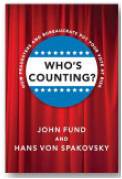|
|
|
Political scientist Walter Dean Burnham once noted that the United States is home to "the modern world's sloppiest electoral systems." He was right, and authors John Fund and Hans von Spakovsky have the research to prove it. Interest in and concern about voter fraud in the United States is high, yet it's a topic rarely covered in the media. This makes Fund and Spakovsky's new book all the more important. This has had several bad effects. The recount following the 2000 presidential elections left countless voters feeling disenfranchised, cynical, and not eager to participate in future elections. Voter participation is already far too low -- U.S. voter turnout is ranked 139th out of 163 democracies. "The more that voting is left to the zealous or self-interested few," write the authors, "the more we see harshly personal campaigns that dispense with any positive vision of our national future." Low voter turnout isn't the only problem with election fraud. Just a few years ago, a Zogby poll found that 38% of Americans still thought the 2000 election outcome was questionable. "The 2000 election may have marked a permanent change in how elections can be decided," argue Fund and Spakovsky. "The number of election-related lawsuits has skyrocketed since 2000. . . . If the trend toward litigation continues, winners in the future may have to hope not only that they win, but that their leads are beyond 'the margin of litigation'." Plenty of voter fraud goes unprosecuted, and that lack of accountability can have disastrous results. The authors describe, for example, a series of forgeries in Indiana that add up to "the very real possibility . . . that systematic voter fraud led to Barack Obama appearing on a ballot in a state where he would not otherwise have qualified to run." In Who's Counting? the authors also take a look at ACORN, voter ID laws, noncitizen voters, vote buying, absentee ballot fraud, and the active disenfranchisement of military voters. "Scrutinizing our own elections the way we have traditionally scrutinized voting in developing countries is a sad, but necessary, step in the right direction," they write. (Encounter Books, 2012, 298 pp., $16.99) |
 In Who's Counting? How Fraudsters and Bureaucrats Put Your Vote at Risk, the authors argue that our nation's "haphazard" and "fraud prone" election system is "more befitting a Third World country than the world's leading democracy," and that this sloppiness has already led to the passage of reams of bad legislation and fostered significant corruption.
In Who's Counting? How Fraudsters and Bureaucrats Put Your Vote at Risk, the authors argue that our nation's "haphazard" and "fraud prone" election system is "more befitting a Third World country than the world's leading democracy," and that this sloppiness has already led to the passage of reams of bad legislation and fostered significant corruption.

